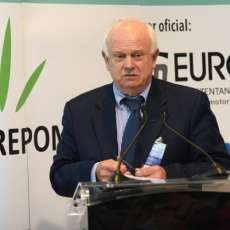PATRES was founded in 2014 by a group of renewable energy producers who wanted to create better dialogue with public authorities and represent their interests more effectively. The organization currently holds 109 members with a total installed capacity of 1800MWh and a total investment of EUR 2.7bn. It has evolved in time based on four key technologies: photovoltaics, wind, micro-hydro power plants and a small biomass segment.
Romania boasts an incredible potential for renewable energy if we consider its resources. How does renewable energy presently fit into Romania’s energy landscape?
VL: Romania has already exceeded the 24% quota set by the European Union, however, production levels have decreased compared to last year. More specifically, although the total energy consumption in Romania has increased, the share of renewable energy in this total consumption decreased by 5% in 2018 compared to 2017. This happened because no new investments were made, and this lack of appetite is further caused by the long investment recovery periods - in the current market conditions, recovery can take up to 30 years, a very long time given that a reasonable period is normally 5-10 years. We expect this to change in the next period though, given for example the fact that the price of technology has decreased considerably.
At present, the energy mix includes coal (still quite high in proportion given today's requirements), a fairly large amount of hydro and nuclear, and about a quarter of it is renewable energy. The target assumed by Romania going forward is to reach a share of 27.9% clean energy by 2032, below the European average and well below the actual potential of the country. The future belongs to renewable energy, and as an organization we want to see an energy mix in which renewable energy holds a strategic value for the country.
The support scheme for green certificates has caused a boom in the industry, but also a a lot of turbulence. What is the situation today?
VL: In terms of investment a credible legal framework is essential, and unfortunately what we have seen in the renewable industry was a pendulum policy: from very advantageous (perhaps too advantageous) facilities that were offered in 2008, when a large number of green certificates were issued, to the sudden change in legislation that severely affected the value of the investments. The support scheme ended in 2016 and there is currently a surplus of 13.5 million green certificates without a buyer - the total value is around EUR 400 million, an amount that final consumers basically owe to producers of renewable energy.
MV: ANRE Order 78/2014 was a big step back, and through the quantitative restrictions that occurred then, renewable energy was de facto excluded from the long-term bilateral energy contracts market. A positive news in this matter was the initiative that ANRE is currently working on, regarding bilateral agreements and flexibility for long-term transactions. Our organization believes that it is mandatory to introduce this product as soon as possible in the regulatory framework, especially considering the emergence of renewable energy sources in the energy mix, sources that by their nature are 100% variable as output power.
What projects stand out at a national level in the field of renewable energy?
VL: A great news was the introduction of the "prosumer" concept and the launch of a national program for the installation of photovoltaic panels. The program encourages individuals to mount photovoltaic panels on individual residences, to cover their own consumption and to transfer the overhead into the national grid. Going live has been a challenge though, because of various implementation issues, for example related to how the overhead will be transferred into the network and how prosumers will be compensated. We want all matters in question to be clarified quickly and to see this program progressing, because it contributes positively to the development of renewable industry overall.
MV: It is worth noting that the Ministry of Energy through the National Climate Change Plan has introduced a limit of 750MWh by 2030 for prosumers; when this limit has been reached, panels can no longer be installed. It seems that if this limit is exceeded, system imbalances could occur because the network is rather old, which signals a need for additional investment in the field.
What is your outlook regarding how the market will evolve over the next few years?
VL: The legal framework at EU level will force us to change, including through pollution reduction obligations. Prices for CO2 certificates reached EUR 26 (compared to EUR 5 as they used to cost 2-3 years ago) which is likely to stimulate the renewable sector. At the organizational level, we aim to persuade other producers to enter our big family - as long as we work as a team, we can succeed in arriving at reasonable and feasible public policies.
MV: People have become rather upset with green certificates but however you look at it, the final consumer will have to pay a certificate: either a green one that will support the development of clean energies, or a CO2 certificate. Ultimately this depends on what we as a community want to support going forward.






